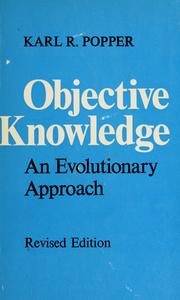| Listing 1 - 8 of 8 |
Sort by
|
Book
ISBN: 9053528008 9789053528006 Year: 2003 Publisher: Amsterdam Boom
Abstract | Keywords | Export | Availability | Bookmark
 Loading...
Loading...Choose an application
- Reference Manager
- EndNote
- RefWorks (Direct export to RefWorks)

ISBN: 0226458083 9780226458083 0226458075 9780226458076 Year: 2000 Publisher: Chicago (Ill.) : University of Chicago press,
Abstract | Keywords | Export | Availability | Bookmark
 Loading...
Loading...Choose an application
- Reference Manager
- EndNote
- RefWorks (Direct export to RefWorks)
Thomas S. Kuhn's classic book is now available with a new index. "A landmark in intellectual history which has attracted attention far beyond its own immediate field. . . . It is written with a combination of depth and clarity that make it an almost unbroken series of aphorisms. . . . Kuhn does not permit truth to be a criterion of scientific theories, he would presumably not claim his own theory to be true. But if causing a revolution is the hallmark of a superior paradigm, [this book] has been a resounding success." --Nicholas Wade, 'Science' "Perhaps the best explanation of [the] process of discovery." --William Erwin Thompson, 'New York Times Book Review' "Occasionally there emerges a book which has an influence far beyond its originally intended audience. . . . Thomas Kuhn's 'The Structure of ' 'Scientific Revolutions' . . . has clearly emerged as just such a work." --Ron Johnston, 'Times Higher Education Supplement' "Among the most influential academic books in this century." -- 'Choice' --One of "The Hundred Most Influential Books Since the Second World War," 'Times Literary Supplement' Thomas S. Kuhn was the Laurence Rockefeller Professor Emeritus of linguistics and philosophy at the Massachusetts Institute of Technology. His books include 'The Essential TensionBlack-Body Theory and the ' 'Quantum Discontinuity, 1894-1912;' and 'The Copernican ' 'Revolution.'
Science --- History. --- Philosophy. --- Normal science --- Philosophy of science --- History --- Philosophy --- Science - Philosophy --- Science - History --- Q 175 Philosophy. Methodology (General works)
Multi
ISSN: 21173508 ISBN: 9782812414190 9782812414206 2812414197 2812414200 Year: 2013 Volume: 6 Publisher: Paris : Classiques Garnier,
Abstract | Keywords | Export | Availability | Bookmark
 Loading...
Loading...Choose an application
- Reference Manager
- EndNote
- RefWorks (Direct export to RefWorks)
Les méthodes utilisées pour analyser la science d'hier et d'aujourd'hui peuvent-elles s'enrichir du débat, puis du dialogue des unes avec les autres ? C'est le pari de cet ouvrage qui présente la pluralité des approches méthodologiques en histoire des sciences et des techniques et interroge son épistémologie.
Science --- Technology --- Sciences --- Technologie --- History --- Philosophy --- Histoire --- Philosophie --- Knowledge, Theory of. --- Methodology --- History. --- Historiography. --- Philosophy. --- Science - Philosophy - Methodology - Historiography --- Épistémologie --- Sciences et sciences humaines --- Philosophie et sciences --- Historiographie --- Méthodologie --- Épistémologie. --- Philosophie et sciences. --- Historiographie. --- Méthodologie. --- Épistémologie. --- Méthodologie.
Book
ISBN: 9782130561040 2130561047 Year: 2007 Volume: 2969 Publisher: Paris Presses universitaires de France (PUF)
Abstract | Keywords | Export | Availability | Bookmark
 Loading...
Loading...Choose an application
- Reference Manager
- EndNote
- RefWorks (Direct export to RefWorks)
Depuis près d'un demi-siècle, l'approche constructiviste de l'épistémologie a permis des réflexions et des explorations qui ont profondément renouvelé cette discipline, ce dont cet ouvrage rend compte.
kennisleer --- epistomologie --- Theory of knowledge --- Q 175 Philosophy. Methodology (General works) --- Philosophy --- Constructivism (Education) --- Epistemology --- Constructivism (Philosophy) --- Knowledge, Theory of --- Constructivisme (Philosophie) --- Théorie de la connaissance --- Sciences sociales --- Epistémologie --- Constructivisme --- Methodology --- Théorie de la connaissance --- Social sciences --- Social sciences - Methodology
Book
ISBN: 2070719421 9782070719426 Year: 1990 Volume: 161 Publisher: [Paris] : Gallimard,
Abstract | Keywords | Export | Availability | Bookmark
 Loading...
Loading...Choose an application
- Reference Manager
- EndNote
- RefWorks (Direct export to RefWorks)
La technique et la science constituent désormais les forces productives les plus importantes des sociétés développées. Cette situation nouvelle pose le problème de leur relation avec la pratique sociale, telle qu'elle doit s'exercer dans un monde où l'information est elle-même un produit de la technique. Jürgen Habermas examine dans les études réunies dans ce volume l'incidence de la rationalité scientifique sur le « monde social vécu » et ses répercussions sur le fonctionnement de la démocratie. Il montre les limites de la technocratie qui tend à s'abriter derrière une pseudo-rationalité pour assurer le triomphe de ses intérêts. Il analyse le système des valeurs en cours, les finalités que se propose le corps social sans toujours en avoir conscience, la fonction des idéologies qui les systématisent. Du même coup il est ici abordé une des plus grandes questions de notre temps : comment le consensus social que postule la démocratie peut-il s'opérer dans les sociétés industrielles avancées ?
Technocracy --- Technocratie --- Technology and civilization. --- Marcuse, Herbert, --- Hegel, Georg Wilhelm Friedrich, --- Technology --- Philosophy --- Science --- Marcuse, Herbert, - 1898-1979. --- Hegel, Georg Wilhelm Friedrich, - 1770-1831. --- Technology and civilization --- Hegel, Georg Wilhelm Friedrich, - 1770-1831 --- Marcuse, Herbert, - 1898-1979 --- Q 175 Philosophy. Methodology (General works) --- sociologie --- democratie --- philosophie --- démocratie --- science --- technique
Book
ISBN: 9780226180281 022618028X 9780226180311 022618031X Publisher: Chicago University of Chicago Press
Abstract | Keywords | Export | Availability | Bookmark
 Loading...
Loading...Choose an application
- Reference Manager
- EndNote
- RefWorks (Direct export to RefWorks)
Abduction (Logic) --- Qualitative research. --- Science --- Methodology. --- Scientific method --- Logic, Symbolic and mathematical --- Qualitative analysis (Research) --- Qualitative methods (Research) --- Research --- Logic --- Reasoning --- Syllogism --- #SBIB:303H30 --- Kwalitatieve methoden: algemeen --- Q 175 Philosophy. Methodology (General works) --- Methods --- Qualitative Research --- Research methods --- Abduction (Logic). --- Qualitative methods in social research --- Qualitative research --- Methodology
Book
ISBN: 3030024326 3030024318 Year: 2018 Publisher: Cham : Springer International Publishing : Imprint: Palgrave Macmillan,
Abstract | Keywords | Export | Availability | Bookmark
 Loading...
Loading...Choose an application
- Reference Manager
- EndNote
- RefWorks (Direct export to RefWorks)
This book investigates the contribution of R.G. Collingwood to the field of philosophical methodology through a discussion of Collingwood’s conception of the role and character of philosophical analysis. It explores questions, such as, is there anything distinctive about the activity of philosophizing? If so, what distinguishes philosophy from other forms of inquiry? What is the relation between philosophy and science and between philosophy and history? For much of the twentieth century, philosophers philosophized with little self-awareness; Collingwood was exceptional in the attention he paid to the activity of philosophizing. This book will be of interest both to those who are interested in Collingwood’s philosophy and, more generally, to all who are interested in the question ‘what is philosophy?’.
Philosophy. --- Theory (Philosophy). --- Science --- History-Philosophy. --- Philosophical Methodology. --- Philosophy of Science. --- Philosophy of History. --- Normal science --- Philosophy of science --- Philosophy --- Mental philosophy --- Humanities --- Philosophy and science. --- History—Philosophy. --- Science and philosophy --- History --- PHILOSOPHY / Methodology --- Collingwood, R. G. --- Collingwood, Robin George, --- Kʻollingudŭ, --- Kollingvud, R. Dzh., --- كولنجوود، ر. ج. --- Methodology. --- Philosophical Methods. --- Humanities Methodology --- Methodology

ISBN: 9780198243700 0198750242 0198243707 9780198750246 Year: 1975 Publisher: Oxford Clarendon
Abstract | Keywords | Export | Availability | Bookmark
 Loading...
Loading...Choose an application
- Reference Manager
- EndNote
- RefWorks (Direct export to RefWorks)
Q 175 Philosophy. Methodology (General works) --- Knowledge, Theory of --- Induction (Logic) --- Knowledge, Theory of. --- Théorie de la connaissance. --- Induction (logique) --- Realism --- Théorie de la connaissance --- Réalisme --- Induction (Logique) --- #GROL:SEMI-1-05'19' --- #SBIB:1H40 --- #SBIB:321H50 --- 159.95 --- 159.95 Geestelijke functies --- Geestelijke functies --- Epistemology --- Theory of knowledge --- Philosophy --- Psychology --- Inductive logic --- Logic, Inductive --- Logic --- Reasoning --- Epistemologie, methoden in de filosofie --- Westerse politieke en sociale theorieën vanaf de 19e eeuw: liberalisme --- 159.9 --- 159.95*1 --- 159.95*1 Cognitieve psychologie --- Cognitieve psychologie --- Psychologie: zie ook: Psychiatrie: n-{616.89-008} en n-{615.851} --- 16 --- Logica. Kennistheorie. Logische methodiek. Wetenschapsfilosofie --- Induction (Logic).
| Listing 1 - 8 of 8 |
Sort by
|

 Search
Search Feedback
Feedback About UniCat
About UniCat  Help
Help News
News